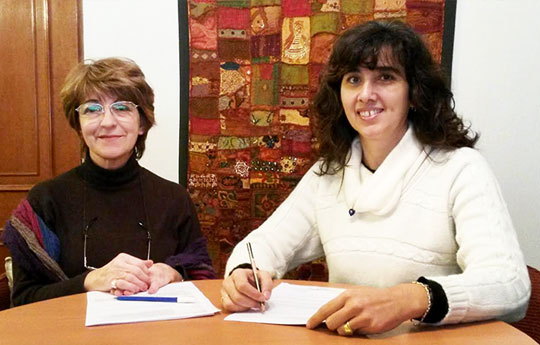CONICET INTERVIEW CYCLE
“YOGURITO is an example of multi-sectoral interaction with impact on the society”
CONICET professionals participate in a scientific nutritional programme of technology transfer for the development of an enriched yogurt.
Graciela Font, CONICET senior researcher and director of the Reference Centre for Lactobacilli (CERELA-CONICET), works together with María Pía Taranto, independent researcher of the Council, on the study of the properties of the lactic bacterium Lactobacillus rhamnosus CRL 1505. They also work on its implementation in the development of probiotic functional food, that is to say, live microorganisms that when administered in measured quantities are capable of producing a beneficial effect on consumer health.
In 2007, after years of research, YOGURITO, a yogurt enriched with Lactobacillus rhamnosus CRL 1505, was introduced. The effect of this product was tested on children with vulnerable health. The Government of the province of Tucumán included this yogurt in the eating plans of the province in 2008 because of its benefits.
This product is the result of a cross-sectoral work among the Ministries of Social Development, Education and Health of Tucumán, the portfolio of Science, Technology and Productive Innovation, the CERELA and a local SME in charge of making the dairy products with the probiotic.
How do children benefit from YOGURITO?
MPT: This type of food improves the whole body condition because it strengthens the body’s natural defences by boosting the immune system. When children consume it, they are in better conditions to deal with intestinal or respiratory infections. YOGURITO enhances the work of the antiparasitics by reducing the number and the type of parasitic disease. These benefits contribute to the reduction of child morbidity caused by the most prevalent diseases in childhood, a more serious situation for populations with basic needs unsatisfied. Besides, this is reflected in a lower dropout rate.
Who are YOGURITO consumers?
GF: Currently, YOGURITO is consumed by school age children, particularly during primary school as part of breakfast or tea. A number of 200 students who attend public primary schools in the city of San Miguel de Tucumán and its surroundings receive this probiotic yogurt three times a week during school time.
What are probiotic foods?
MPT: They are included in the group of functional food, whose properties transcend the inherent properties per se of the food. When we talk about probiotics, we refer to lactic bacteria, microorganisms safe for men and animals. A lactic bacterium is probiotic when it meets all basic requirements, such as the capacity to survive the gastrointestinal tract tolerating acidic conditions and reaching the intestine in sufficient quantities to exert its positive effects on consumer health.
What is the difference between YOGURITO and the rest of the ordinary yogurts?
MPT: The one that is not probiotic has the same benefits as a dairy product, that is to say that it provides nutrients and important oligoelements. However, the consumption of probiotic food produces more than the nutritional benefits of the product per se: it strengthens the natural defenses making the consumer less prone to disease.
What is the importance of the project at a social level?
GF: With this programme, the interest of teachers and parents of children who receive the yogurt increased. They wanted to learn more about a healthy diet and incorporate good hygiene and nutrition habits. In this case, the children themselves transferred this knowledge. YOGURITO represents an interaction paradigm among the scientific-technological, productive and public sectors with a noticeable impact on the society.
In which provinces was the programme implemented? Is there any project to expand it?
GF: The project transcended the boundaries of Tucumán and other provinces also became part of this initiative whose core is innovation and social inclusion. Some of the provinces that adopted the initiative are: Santiago de Estero, San Juan, Entre Ríos and recently, through an agreement with CONICET, the municipality of Luján, in the province of Buenos Aires. Undoubtedly, we would like that this type of project could be implemented in all the country to enhance the sanitary condition of the child population.
Does CERELA develop other similar products?
MPT: From the production of the probiotic microorganism CRL1505, other products were developed for the social market. These ones are BIOSEC, a dehydrated probiotic, and CHOCOLET, a probiotic chocolate milk that were included in the 2010 Social Programme. Thus, the benefits for school children in areas of difficult access were extended. Another product, which is about to be added to the previous ones, is a probiotic cheese made of the same strain.
GF: Other technology developments on a prototype scale are, for instance, dietary supplements with gastroprotector effect or functional beverages with dairy derivatives such as whey. We hope that these products could be part of the social or commercial market like YOGURITO, CHOCOLET and BIOSEC. In this case, we want these products to preserve the social spirit and have affordable price so that they could be consumed by all the population, even the disadvantaged ones.
The Yogurito research team at CERELA- CONICET is comprised of:
- Susana Álvarez. Principal researcher.
- Julio Villena. Associate researcher.
- Susana Salva. Assistant researcher.
- Martha Núñez de Kairuz. Principal professional.
- Verónica Molina. Associate professional.
- María José Fornaguera. Assistant professional.
- Mariano Obregozo. Associate professional.
- By Cecilia Leone.
